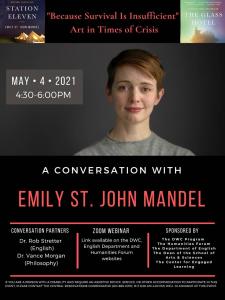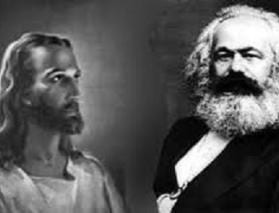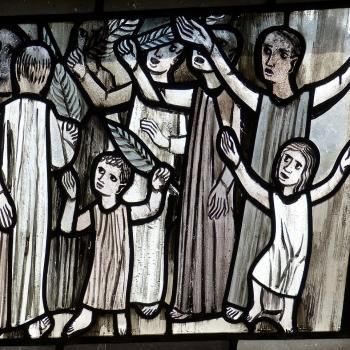“Remember K from our colloquium last year?” my teaching partner emailed late last week. “G [a student in our colloquium this year] is K’s roommate; G tells me that K got a ‘Survival is Insufficient’ tattoo!” The subject line of the email was “Education leaves a mark!” Let me explain.
 We are in the last week of my “Apocalypse” colloquium; our final text is Emily St. John Mandel’s 2014 novel Station Eleven. Thanks to the tireless efforts of my teaching colleague, our class today will be visited by the author herself, who also will be doing an afternoon event for the whole college community with the title “Art in Times of Crisis—A Conversation with Emily St. John Mandel.” Trust me, this is a big deal. I only wish that by this time the pandemic was behind us that Emily St. John Mandel could join us in person.
We are in the last week of my “Apocalypse” colloquium; our final text is Emily St. John Mandel’s 2014 novel Station Eleven. Thanks to the tireless efforts of my teaching colleague, our class today will be visited by the author herself, who also will be doing an afternoon event for the whole college community with the title “Art in Times of Crisis—A Conversation with Emily St. John Mandel.” Trust me, this is a big deal. I only wish that by this time the pandemic was behind us that Emily St. John Mandel could join us in person.
Station Eleven is set in a post-apocalyptic world in the aftermath of a pandemic that killed over 99.9% of the earth’s human population. Not surprisingly, our current colloquium students have found this novel eerily relevant to the world in which we have all lived for the past fourteen months. But that is nothing compared to how strange it was last year to study this novel in the early weeks of the new world of pandemic shut down. The graduating seniors were robbed of all traditional end-of-your-college-career events that are so important. I imagined at the time what I would say to the graduating seniors if I had the chance. As I return to my remarks a year later, I find that much of it is still directly relevant.
Dear Graduating Seniors:
This is not what you hoped for. This is not how you imagined your years of hard work, commitment, and dedication at Providence College would end. Some very important events, celebrations meant to honor you and to establish lifelong memories, have been cancelled. They are irreplaceable, and their loss is palpable, even for those who, as I, are accustomed to annually standing on the fringes of such gatherings and smiling a lot, occasionally glimpsing students from the past four years hugging each other, as well as their friends and families, and perhaps even having the privilege of meeting the most important people in the lives of the students who have become so important to me.
But none of that is happening this year. And it’s sad. And the loss of graduation celebrations is just one aspect of how your worlds—how all of our worlds—have been turned upside down. Whatever your plans were last January for this coming summer, for the fall, for graduate school or starting the job that would launch you into your new career, those plans have—as my brother-in-law would say—gone “tits up.” We can’t wait until things get back to normal, until we can move our lives from “on hold” status to “reboot” or “move forward” status. Until we can stop just surviving and start living.
We know, though, that we are currently in the middle of one of those events that will mark “before” and “after” for the rest of our lives. However we define “normal” gradually over the coming weeks and months, it will undoubtedly be different than the pre-coronavirus “normal” in important and irreversible ways. Some things aren’t coming back. Others will return in significantly different forms.
In one of the strangest confluences of imagination and reality I’ve ever encountered, I team-taught a colloquium this semester called “Apocalypse.” During the last half of the course, we studied various apocalyptic texts—from novels and documentaries to comic books and movies—while immersed with everyone else across the globe in an apocalyptic event. Even more strangely, our last text of the semester—Emily St. John Mandel’s 2014 novel Station Eleven—is about a global pandemic that kills off 99.9% of the world’s population. In the post-apocalyptic world, a group of musicians and actors who call themselves the “Travelling Symphony” wanders from small community to small community performing works of Shakespeare and giving concerts.
Why? In a world in which survival from day to day is not guaranteed, in which deadly cults and feral gangs threaten around every corner, what is the value of Shakespeare? Why listen to a concert? The answer is provided in a slogan written on a banner on the side of one of the group’s caravan wagons, words also tattooed on the arm of Kirsten, the novel’s main character:
Because survival is insufficient
We discussed frequently in our colloquium whether survival is the primary human instinct, whether some lives are not worth living, and what sorts of things make a life worth living. The Travelling Symphony’s slogan reminds us that there is far more to being fully human than simply being alive. In their intellectual notebooks, my students frequently wrote that the truth of this slogan became much more apparent to them as they were socially distanced and isolated at home.
One student illustrated her point by referencing Clark, another central character in Station Eleven. Before the pandemic, Clark was a corporate problem-solver, hired by various firms to help “fix” various leadership problems. During an interview with a woman whose boss was Clark’s current target, she described her boss as a “high-functioning sleepwalker,” a man who she suspects will become more efficient and productive with Clark’s help, but who will still remain a “joyless bastard.” Her boss is one of “those people who’ve ended up in one life instead of another and they are just so disappointed. They’ve done what’s expected of them. They want to do something different but it’s impossible now, there’s a mortgage, kids, whatever, they’re trapped.”
Two decades later in a post-pandemic world, Clark realizes that he himself, wealthy and successful, had been a “high-functioning sleepwalker.” Remembering his pre-apocalyptic self, Clark noted that
He had been moving through the motions of his life for a while . . . not specifically unhappy, but when had he last found real joy in his work? When was the last time he’d been truly moved by anything? When had he last felt awe or inspiration?
My student suggested that reading this during coronavirus seclusion motivated her to look for answers to Clark’s questions for herself. What are the things that last, that bring joy, satisfaction, contentment, or inspiration when the things you thought you could depend on get taken away? How does one avoid being like Clark before the pandemic?
In another one of my classes, I spent a semester with my students in the world of 16th-century French philosopher Michel de Montaigne. Montaigne’s world was violent and unpredictable; in his essays he frequently sought for strategies intended to establish peace, centeredness, and confidence in the midst of swirling chaos. One of my students’ favorite passages from Montaigne comes from his essay “Of solitude.”
We should have wife, children, goods, and above all health, if we can; but we must not bind ourselves to them so strongly that our happiness depends on them. We should set aside a room at the back of the shop, just for ourselves, quite isolated, where, as the principal retreat for our solitude, we establish our true freedom.
What is in your “room at the back of the shop”? Have you ever entered it? Are you even aware of its existence? Many of my students told me that coronavirus seclusion introduced them, some for the first time, to the internal space where one is perfectly free to decide who they are and what they will be. “In that back room,” one student wrote, “I began to discover who I am, what my true loves and interests are, apart from what I think other people—even those whom I love the most—expect me to be.”
My hope for each of you is that you will become acquainted with the room at the back of your shop. Use it to identify what matters to you the most. If survival, simply keeping your head above water, is insufficient, use your back room to discover what—uniquely for you—is central to a life that far exceeds mere sufficiency. Become a deliberate and intentional person. The world already has too many high-functioning sleepwalkers.

















